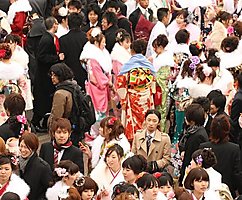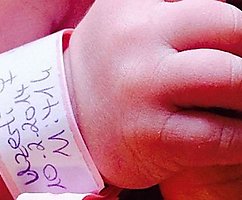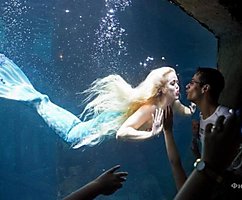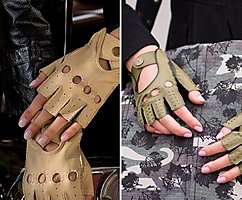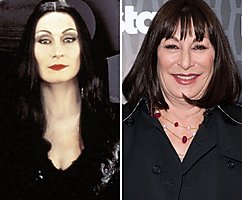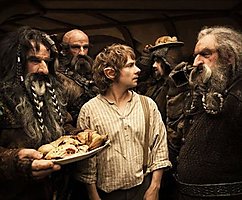Childhood memories: where to go and why
 Bashny.Net
Bashny.Net
Where does childhood memories? Why our brain is able to forget? Can you believe the fragments of memory?
The problem of childhood memories worries scientists is not the first year, and recent studies of psychologists and neuroscientists are able to more clear in these matters.
My memories - like gold in your wallet, a gift from the devil:
open it, and then the dry leaves.
Jean-Paul Sartre

Childhood. River. Iridescent water. White sand. Dad taught me to swim.
Or here's another: kladiki. Dial up any type of junk beads, colored stёklyshek, wrappers from candy and chewing gum, razroesh in the ground a small pit, dropping to his treasure, all this pre prizhmёsh found glass bottle and zasyplesh zemelku. No one will ever find them and then do not, but we love to do those same kladiki.
My memory of the time of kindergarten here reduced to such individual moments: sweaty finger drawing on window glass, plaid shirt brother, dark winter street dotted with red lights, electric cars in the children's park
. When we try to remember my life before birth, it turns out only to see these glimpses into the memory of the closet, despite the fact that we're about something then thought something felt and learned a lot about the world in those days.
< br> Where did all these childhood memories, these years?
The problem of childhood memories and the inevitable forgetting fit into a simple definition of psychologists - "children's amnesia". On average, people's memories reach the age when they were 3-3, 5 years, and everything that happened before that becomes a dark abyss. A leading expert on the development of memory from Emory University Dr. Patricia Bauer says:
This phenomenon demands our attention because it is the paradox: many children are perfectly remembers the events of his life, but, as adults, they remain a small part of his memoirs
. In the past few years, scientists especially closely involved with this issue and it seems that they were able to unravel what is happening in the brain when we lose our memories of the very first years.
And it all began with Freud, which is still in 1899, came up for the described phenomenon, the term "infant amnesia." He argued that adults forget their first years of life in the process of suppression of disturbing sexual memories. While some psychologists have supported this statement, the most common explanation for infant amnesia boiled down to the fact that up to seven years, children are simply not capable of forming a stable memory, although evidence to support this theory was negligible. For nearly a hundred years, psychologists have assumed that memories of childhood do not survive in the first place because they are unable to be durable.
The end of 1980 marked the beginning of the Reformation in the field of child psychology. Bauer and other psychologists began to explore the children's memory by using a very simple way: in front of the child build a very simple toy and broke it after the beep, and then observed whether the child is able to imitate adult actions in the correct order, but in the extended time range from a few minutes up to several months.
One experiment after another showed:
memories of children 3 years old and younger are actually saved, albeit with restrictions;
at the age of 6 months babies remember at least the last day;
9 months events stored in the memory of at least 4 weeks;
at the age of two years -. during the year
But scientists have found that a child of four and a half years could recall in detail a trip to Disney World, which was held for 18 months before the historic th 1991 study.
However, about 6 years old, children begin to forget many of these early memories. Another experiment of 2005, which was carried out Dr. Bauer and his colleagues found that children as young as five and a half years, recalled more than 80% of the experience that they had up to 3 years of age, while children who were seven and a half years, could remember at least 40% of what is happening to them in childhood.
This work revealed the contradictions which are at the heart of the "infantile amnesia": small children are able to remember events in the first few years of life, but most of these memories will eventually disappear with rapid speed, which does not seem to forgetting mechanisms inherent in adults .
Puzzled by this contradiction, the researchers began to speculate: maybe for long-lasting memories, we must master the speech or self-consciousness - in general, to get the fact that not too developed in childhood. But, despite the fact that verbal communication and self-awareness, of course, reinforce human memory, their absence can not fully explain the phenomenon of children's amnesia. In the end, some of the animals that have a sufficiently large brain relative to their body, but do not have the language and our consciousness level, also lose their memories, which relate to their infancy (eg, rats and mice).
Guesses have lasted as long as scientists have not paid attention to the main bodies involved in the process of memory - our brain. Since then, the problem of childhood memories has been the subject of attention Neuroscientists around the world, and one after another began to appear studies that explain the cause of the disappearance of our memory.
The fact is that between birth and adolescence of the brain structures continue to evolve. With a massive wave of growth in the brain acquires a large number of neural connections, which decrease with age (at some point we just need this "neural boom" - to quickly adapt to our world and learn the most necessary things; more such contact happens)
So as Bauer found out, this particular brain adaptability has its price. While the brain is experiencing prolonged after the birth of the development outside the mother's womb, a large and complex network of neurons in the brain that create and support our memories, is itself under construction, so it is not capable of forming memories in the same way as it does adult brains . As a result, long-term memories, formed in the early years of our lives are the least stable of all that we have come in the time of life, and tend to disintegrate during adulthood.
A year ago, a neurologist at Children's Hospital, Toronto, Paul Frankland and his colleagues published a study "neurogenesis of the hippocampus regulates forgetting process in infancy and adulthood," demonstrates another reason for children's amnesia. According to scientists, the memories not only worsen, but also become hidden. Several years ago, Frankland and his wife, who is also a neurologist, began to notice that in mice they studied, for certain types of memory tests, it has worsened after a life in a cage with a wheel. Scientists have linked this to the fact that running on the wheel promotes neurogenesis - the process of the emergence and growth of entire new neurons in the hippocampus, a brain area that is important for memory. But while adult hippocampal neurogenesis probably contributes to the ability of learning and memory, it may be relevant to the forgetting process during growth of the organism. Just as in the forest can only grow a certain number of trees, the hippocampus is able to accommodate a limited number of neurons. As a result, there is something that happens in our lives all the time, new brain cells displace other neurons from their territory, or sometimes even completely replace them, which in turn leads to a restructuring of the mental circuits that can store individual memories. As assume scientists, especially the high level of neurogenesis in infancy is partly responsible for the children's amnesia.
Besides experimenting with cross-country wheel scientists used the "Prozac", which stimulates the growth of nerve cells. Mice given the drug, began to forget the experiments that were carried out with them before, while individuals who are not receiving medication, still remembered and well-oriented in their familiar environment. Conversely, when the researchers prevented neurogenesis small animals by means of genetic engineering, in young animals began to form a much more stable memories.
However, Frankland and Dzhozelin went even further: they decided to carefully examine how neurogenesis alters the structure of the brain and what happens with the old cells. Their latest experiment is worthy of the most daring conjectures of science fiction writers: with the help of scientists inserted the virus into the DNA of a gene that is able to encode a protein on the fluorescence. As shown by the luminous colors, new cells can not replace old - rather, they are connected to an existing scheme
. This restructuring of memory circuits means that while some of our childhood memories really leave, others are stored in an encrypted form refracted. Apparently, this explains the difficulty with which we are given at times to remember something.
But even if we manage to unravel the tangles of multiple different memories, we can never fully trust resurrected paintings - some of which may be partially or completely fabricated. This study confirms Elizabeth Loftus of the University of California, Irvine, due to which it became known that our earliest memories are insoluble mixture of authentic memories, stories that we absorbed from others, and imaginary scenes, invented by the subconscious.
As part of the experiment, Loftus and her colleagues presented the volunteers a few short stories about their childhood, told relatives. Unbeknownst to the participants in the study, the researchers included a concocted story that, in fact, was a fiction - the loss was five years old at the mall. However, a quarter of the volunteers said that they remember about it. And even when they were told that one of the invented stories, some participants were not able to determine that it was a story about a shopping center.
A science journalist, deputy chief editor of the magazine Scientific American Ferris Jabr (Ferris Jabr) reflects on this score:
When I was little, I got lost in Disneyland. That's what I remember: it was December and I watched the Iron train through the Christmas village. When I turned around, my parents were gone. As my body went cold sweat. I began to sob, and wander through the park in search of mom and dad. The man came up to me and led to huge buildings filled with TV screens broadcast the security cameras of the park. I saw my parents on one of these screens? No. We returned to the train, where he found them. I ran to him with joy and relief.
Recently, for the first time in a long time, I asked my mother what she remembers about the day at Disneyland. She says that it was spring or summer, and it was the last time I saw a number of remote control boats remote control of the attraction "Jungle Cruise" and not near the railroad. As soon as they realized that I was lost, they went straight to the center lost and found. The caretaker of the park really found me and brought to the center, where I was, quite eat the ice cream, and found the parents. Of course, no evidence or could not find it, nor my memories, but we are left with something far more elusive:. Those little embers of the past embedded in our consciousness, flickering like fool's gold
Yes, we lose our childhood memories, to be able to grow and develop further. But honestly, I do not see in big trouble. The most expensive, the most important thing we always take with him into adulthood: the smell of my mother's spirits, feeling the heat of her hands, self-confident smile of his father, a brilliant river and magical feeling of a new day - all those kladiki childhood that remain with us until the end.
The problem of childhood memories worries scientists is not the first year, and recent studies of psychologists and neuroscientists are able to more clear in these matters.
My memories - like gold in your wallet, a gift from the devil:
open it, and then the dry leaves.
Jean-Paul Sartre

Childhood. River. Iridescent water. White sand. Dad taught me to swim.
Or here's another: kladiki. Dial up any type of junk beads, colored stёklyshek, wrappers from candy and chewing gum, razroesh in the ground a small pit, dropping to his treasure, all this pre prizhmёsh found glass bottle and zasyplesh zemelku. No one will ever find them and then do not, but we love to do those same kladiki.
My memory of the time of kindergarten here reduced to such individual moments: sweaty finger drawing on window glass, plaid shirt brother, dark winter street dotted with red lights, electric cars in the children's park
. When we try to remember my life before birth, it turns out only to see these glimpses into the memory of the closet, despite the fact that we're about something then thought something felt and learned a lot about the world in those days.
< br> Where did all these childhood memories, these years?
The problem of childhood memories and the inevitable forgetting fit into a simple definition of psychologists - "children's amnesia". On average, people's memories reach the age when they were 3-3, 5 years, and everything that happened before that becomes a dark abyss. A leading expert on the development of memory from Emory University Dr. Patricia Bauer says:
This phenomenon demands our attention because it is the paradox: many children are perfectly remembers the events of his life, but, as adults, they remain a small part of his memoirs
. In the past few years, scientists especially closely involved with this issue and it seems that they were able to unravel what is happening in the brain when we lose our memories of the very first years.
And it all began with Freud, which is still in 1899, came up for the described phenomenon, the term "infant amnesia." He argued that adults forget their first years of life in the process of suppression of disturbing sexual memories. While some psychologists have supported this statement, the most common explanation for infant amnesia boiled down to the fact that up to seven years, children are simply not capable of forming a stable memory, although evidence to support this theory was negligible. For nearly a hundred years, psychologists have assumed that memories of childhood do not survive in the first place because they are unable to be durable.
The end of 1980 marked the beginning of the Reformation in the field of child psychology. Bauer and other psychologists began to explore the children's memory by using a very simple way: in front of the child build a very simple toy and broke it after the beep, and then observed whether the child is able to imitate adult actions in the correct order, but in the extended time range from a few minutes up to several months.
One experiment after another showed:
memories of children 3 years old and younger are actually saved, albeit with restrictions;
at the age of 6 months babies remember at least the last day;
9 months events stored in the memory of at least 4 weeks;
at the age of two years -. during the year
But scientists have found that a child of four and a half years could recall in detail a trip to Disney World, which was held for 18 months before the historic th 1991 study.
However, about 6 years old, children begin to forget many of these early memories. Another experiment of 2005, which was carried out Dr. Bauer and his colleagues found that children as young as five and a half years, recalled more than 80% of the experience that they had up to 3 years of age, while children who were seven and a half years, could remember at least 40% of what is happening to them in childhood.
This work revealed the contradictions which are at the heart of the "infantile amnesia": small children are able to remember events in the first few years of life, but most of these memories will eventually disappear with rapid speed, which does not seem to forgetting mechanisms inherent in adults .
Puzzled by this contradiction, the researchers began to speculate: maybe for long-lasting memories, we must master the speech or self-consciousness - in general, to get the fact that not too developed in childhood. But, despite the fact that verbal communication and self-awareness, of course, reinforce human memory, their absence can not fully explain the phenomenon of children's amnesia. In the end, some of the animals that have a sufficiently large brain relative to their body, but do not have the language and our consciousness level, also lose their memories, which relate to their infancy (eg, rats and mice).
Guesses have lasted as long as scientists have not paid attention to the main bodies involved in the process of memory - our brain. Since then, the problem of childhood memories has been the subject of attention Neuroscientists around the world, and one after another began to appear studies that explain the cause of the disappearance of our memory.
The fact is that between birth and adolescence of the brain structures continue to evolve. With a massive wave of growth in the brain acquires a large number of neural connections, which decrease with age (at some point we just need this "neural boom" - to quickly adapt to our world and learn the most necessary things; more such contact happens)
So as Bauer found out, this particular brain adaptability has its price. While the brain is experiencing prolonged after the birth of the development outside the mother's womb, a large and complex network of neurons in the brain that create and support our memories, is itself under construction, so it is not capable of forming memories in the same way as it does adult brains . As a result, long-term memories, formed in the early years of our lives are the least stable of all that we have come in the time of life, and tend to disintegrate during adulthood.
A year ago, a neurologist at Children's Hospital, Toronto, Paul Frankland and his colleagues published a study "neurogenesis of the hippocampus regulates forgetting process in infancy and adulthood," demonstrates another reason for children's amnesia. According to scientists, the memories not only worsen, but also become hidden. Several years ago, Frankland and his wife, who is also a neurologist, began to notice that in mice they studied, for certain types of memory tests, it has worsened after a life in a cage with a wheel. Scientists have linked this to the fact that running on the wheel promotes neurogenesis - the process of the emergence and growth of entire new neurons in the hippocampus, a brain area that is important for memory. But while adult hippocampal neurogenesis probably contributes to the ability of learning and memory, it may be relevant to the forgetting process during growth of the organism. Just as in the forest can only grow a certain number of trees, the hippocampus is able to accommodate a limited number of neurons. As a result, there is something that happens in our lives all the time, new brain cells displace other neurons from their territory, or sometimes even completely replace them, which in turn leads to a restructuring of the mental circuits that can store individual memories. As assume scientists, especially the high level of neurogenesis in infancy is partly responsible for the children's amnesia.
Besides experimenting with cross-country wheel scientists used the "Prozac", which stimulates the growth of nerve cells. Mice given the drug, began to forget the experiments that were carried out with them before, while individuals who are not receiving medication, still remembered and well-oriented in their familiar environment. Conversely, when the researchers prevented neurogenesis small animals by means of genetic engineering, in young animals began to form a much more stable memories.
However, Frankland and Dzhozelin went even further: they decided to carefully examine how neurogenesis alters the structure of the brain and what happens with the old cells. Their latest experiment is worthy of the most daring conjectures of science fiction writers: with the help of scientists inserted the virus into the DNA of a gene that is able to encode a protein on the fluorescence. As shown by the luminous colors, new cells can not replace old - rather, they are connected to an existing scheme
. This restructuring of memory circuits means that while some of our childhood memories really leave, others are stored in an encrypted form refracted. Apparently, this explains the difficulty with which we are given at times to remember something.
But even if we manage to unravel the tangles of multiple different memories, we can never fully trust resurrected paintings - some of which may be partially or completely fabricated. This study confirms Elizabeth Loftus of the University of California, Irvine, due to which it became known that our earliest memories are insoluble mixture of authentic memories, stories that we absorbed from others, and imaginary scenes, invented by the subconscious.
As part of the experiment, Loftus and her colleagues presented the volunteers a few short stories about their childhood, told relatives. Unbeknownst to the participants in the study, the researchers included a concocted story that, in fact, was a fiction - the loss was five years old at the mall. However, a quarter of the volunteers said that they remember about it. And even when they were told that one of the invented stories, some participants were not able to determine that it was a story about a shopping center.
A science journalist, deputy chief editor of the magazine Scientific American Ferris Jabr (Ferris Jabr) reflects on this score:
When I was little, I got lost in Disneyland. That's what I remember: it was December and I watched the Iron train through the Christmas village. When I turned around, my parents were gone. As my body went cold sweat. I began to sob, and wander through the park in search of mom and dad. The man came up to me and led to huge buildings filled with TV screens broadcast the security cameras of the park. I saw my parents on one of these screens? No. We returned to the train, where he found them. I ran to him with joy and relief.
Recently, for the first time in a long time, I asked my mother what she remembers about the day at Disneyland. She says that it was spring or summer, and it was the last time I saw a number of remote control boats remote control of the attraction "Jungle Cruise" and not near the railroad. As soon as they realized that I was lost, they went straight to the center lost and found. The caretaker of the park really found me and brought to the center, where I was, quite eat the ice cream, and found the parents. Of course, no evidence or could not find it, nor my memories, but we are left with something far more elusive:. Those little embers of the past embedded in our consciousness, flickering like fool's gold
Yes, we lose our childhood memories, to be able to grow and develop further. But honestly, I do not see in big trouble. The most expensive, the most important thing we always take with him into adulthood: the smell of my mother's spirits, feeling the heat of her hands, self-confident smile of his father, a brilliant river and magical feeling of a new day - all those kladiki childhood that remain with us until the end.
Tags
Personal development
psychology
women
men
relationships
life
happiness
harmony
love
children
money
wealth
success
See also
Unlived EMOTIONS - compelling Karma
Spiritual causes of serious diseases
Family psychology: what do not know your parents
Discovery, scientists plunged into shock
Richard Davidson: How do your emotions controlled by the brain
Our brain has the ability to change, to recover, and even heal at any age
The fullness of life and happiness comes to us through the mother
Bernard Lown: words that heal
Bert Hellinger: Generic conscience
Where a man desire to hurt or humiliate a woman?


